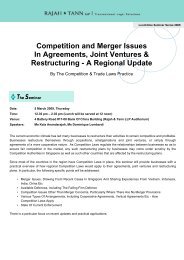Lawlines Volume 9 Issue 4 - eOASIS
Lawlines Volume 9 Issue 4 - eOASIS
Lawlines Volume 9 Issue 4 - eOASIS
Create successful ePaper yourself
Turn your PDF publications into a flip-book with our unique Google optimized e-Paper software.
LawLinesVol 9 . <strong>Issue</strong> 4 • December 2007Around Rajah & TannRound Up – 2007 InPerspectiveFeature ArticlesTo Withhold Or Not ToWithhold – That Is TheQuestionAll Abuzz About GamesCorporate SocialResponsibility UnderThe New IndonesianCompany LawCase BitesLegislation BitesThe global games industry is expected to grow tomore than US$55.6 billion by 2008. The Asia Pacifi conline games market, valued at US$630 millionin 2003, is expected to hit an explosive fi gure ofUS$7.5 billion in 2008.This article is the second and fi nal instalment of atwo-part series. The fi rst article, which appearedin LawLines Vol 9 <strong>Issue</strong> 3, looked at some of theissues that may affect the producer of an animatedfi lm in its exploitation of the completed animatedfi lm. In this article, we will provide a brief overviewof the computer games industry and thereafterdiscuss distribution activities relating to computergames.Types Of GamesComputer games may be categorised as:• PC games;• console games, for example games designed tofunction on the Nintendo Wii, Sony Playstationor Xbox;• arcade games;• handheld games; or• mobile games.With the ubiquitousness of internet accessibility andconnectivity, many PC games are now exploitedvia the internet such as the Massive MultiplayerOnline Games (‘MMOGs’). An MMOG is usually aPC game residing on the game publisher’s servers.Gamers access those servers to compete againstother players.Franchises are an important aspect of the gamesindustry. A franchise refers to a series of connectedgames – such as of the same principal characters orgame title, eg, the Mario Brothers game franchise.Upon the success of a released game, publishersoften leverage on its popularity by relying on it as agame franchise and creating sequels or exploitingit in different game ports or platforms.As opposed to franchises, brand new games carrywith them the risk of failure and the inability ofrecouping the development and marketing cost ofthe game. Similar to the release of a theatrical fi lm,the success of a newly released computer game isdependant on the tastes of consumers, which arepage 19 of 44 pages | print | comments | close












